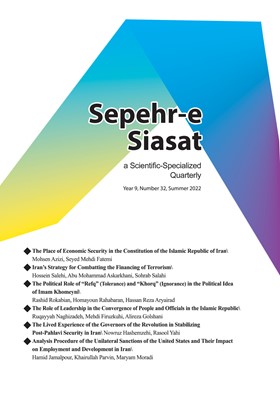Analysis Procedure of the Unilateral Sanctions of the United States and Their Impact on Employment and Development in Iran
Subject Areas : Iranian Political ResearchHamid Jamalpur 1 , KHerolah Parvin 2 * , Maryam Moradi 3
1 - PhD. Student, Department of Law, Qeshm Branch, Islamic Azad University, Qeshm, Iran.
2 - Professor, Department of Law, University of Tehran, Tehran, Iran
3 - Assistant Professor, Department of Public International Law, Qeshm Branch, Islamic Azad University, Qeshm, Iran
Keywords: Economy, Employment, development, United States, Iran, Sanction,
Abstract :
The purpose of the present study is to review and analyze the unilateral sanctions of the US and their impacts on employment and development in Iran. The method of study is descriptive-analytic and an evaluation of the economic sanctions imposed against the Islamic Republic of Iran with regulations and principles of the international law, proves the main hypothesis of this article that is the illegitimacy of such sanctions. Accordingly, the unilateral economic sanctions of the US against Iran have caused some limitations on different economic sections of the country, transfer of technical equipment and knowledge, foreign investment, transportation, payments, and so on. The results of the study show that one of the effects of the unilateral sanctions of the US against the Islamic Republic of Iran that has violated human rights, is the violation of the right of employment. Fluctuation in the process of employment in Iran following the sanctions, has caused the agitation and confusion of a lot of Iranian citizens. Lack of job and occupational security in the country, decline in production, inflation and … are some consequences of the sanctions.
آل کجباف، حسین؛ مدنیان، غلامرضا (1393). نگاه قوانین بینالمللی به مسأله حقوق بشر. قابل دسترس در:
http://smailalipour.blogfa.com/post/39
اقلیم، علیرضا (1389). تاثیر هزینههای نظامی کشورهای منطقه خلیج فارس بر تأمین امنیت آنها. تهران: موسسه چاپ و انتشارات وزارت امورخارجه.
ایده، آسبیورن (1389). حقوق اقتصادی، اجتماعی و فرهنگی. ترجمه اردشیر امیر ارجمند و همکاران. تهران: مجمع علمی و فرهنگی مجد.
پروین، خیرالله؛ دهقانی، امیرعلی (1398). تعارض خصوصیسازی و عدالت اجتماعی در حقوق کار. تأمین اجتماعی، 14(3).
تاموشات، کریستیان (1386). حقوق بشر. ترجمه و نگارش حسین شریفی طراز کوهی. تهران: نشر میزان.
زهرانی، مصطفی (1376). نظریههای تحریم اقتصادی. تهران: وزارت امورخارجه.
زینلی، وحید (1396). بررسی و تحلیل وضعیت حقوق بشر در ایران و عوامل تحریم آن توسط اتحادیه اروپا علیه جمهوری اسلامی ایران. پایاننامه کارشناسی ارشد، رشته جغرافیای سیاسی. موسسه آموزش عالی فرهمند لاریجان.
ساعد وکیل، امیر؛ عسگری، پوریا (1383). حق توسعه و جهانشمولی حقوق بشر، نسل سوم حقوق بشر )حقوق همبستگی). تهران: نشر مجد.
سیمبر، رضا (1389). سیاست خارجی امریکا و تحریمهای جدید علیه جمهوری اسلامی ایران. دانش سیاسی، شماره2.
شکوه، حسن (1390). بررسی ظرفیتهای تحقق 5/2 میلیون شغل در سال 1390. تهران: پژوهشکده مطالعات راهبردی.
شکوهی، سعید (1391). معمای تحریم. تهران: خبرگزاری فارس.
قنبری، علی (پنجشنبه 11 خرداد 1391). سیاستهای دولت، تولید کشور را به سمت بحران و ورشکستگی سوق داد. روزنامه شرق، شماره 1543.
لفت ویچ، آدریان (1383). دموکراسی و توسعه. ترجمه احمد علیقلیان و افشین خاکباز. تهران: طرح نو.
ملکی، عباس (1391). سناریوهایی برای ایران جهت مقابله با تحریم، امریکا و مهار ایران. قابل دسترس در:
www.caspianstudies.com/.../Scenario-%20US%20and%20Iran.doc
موسویان، سید حسن (1394). ایران و آمریکا، گذشته شکستخورده و مسیر آشتی. تهران: تیسا.
میراحمدی، سید محمود؛ رشیدی، حسن (1393). تحریمها و تأثیر آن بر کسبوکار در ایران. مجله اقتصادی، شماره 3-4.
Drezwicki, K. (2001). The Right to Work and Rights in Work. In: Economic, Social and Cultural Rights. Dordecht: Martinus Nijhoff.
Foryst, C.AR. (2010). Ethinking National Security Strategy Priorities. Journal of International & Counter International, 23(3).
Frtland, R. (2017). The Effect of Sanctions on Human Rights, propositions for an alternative world order. Selected papers published on the occasion of the fiftieth anniversary of the United Nations, berlin, Springer
Gharib Abadi, K. (2013). Unilateral Sanctions against Iran and International Law. In: Symposium on Unilateral Sanctions and International Law, P.10-20.
Hove, M. (2012). The Debates and Impact of Sanctions: The Zimbabwean Experience. International Journal of Business and Social Science, 3(5), P.84-72.
Kaempfer, W.H. & Lowenberg, A.D. (2007). The Political Economy of Economic Sanctions. In: T.S. & K. Hartley (Ed.), Handbook of Defense Economics - Defense in a Globalized World (Vol.2, pp. 867-911). London: Elsevier B.V.
Lacy, D. & Niou, E. )2004(. A Theory of Issue Linkage and Economic Sanctions: The Roles of Information, Preferences, and Threats. Journal of Politics, 66(1), P.25-42.
Noland, M. (2008). The (Non) Impact of UN Sanctions on North Korea. Peterson Institute for International Economics.
Nossal, K.R. (2015). Organization: punishment international sanctions as international punishment. International Organization. Toronto, University of Toronto Press.
Tsebelis, G. (1990). Are Sanctions Effective? A game Theoretic Analysis. The Journal of Conflict Resolution, 34(1), P.3-28.
_||_
